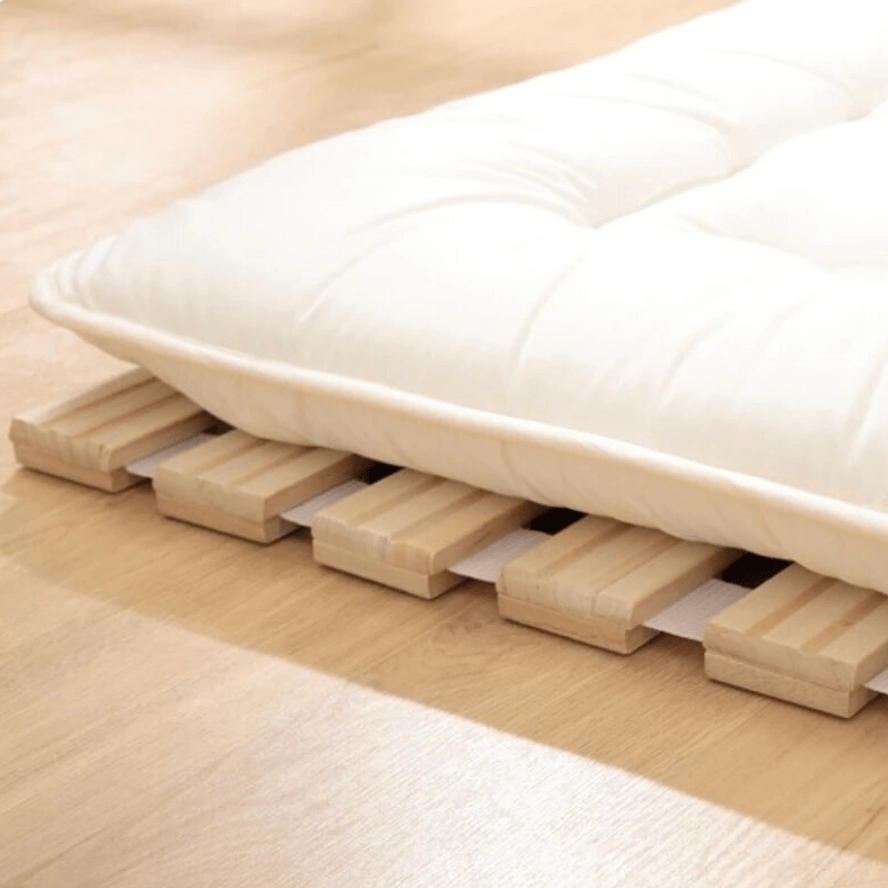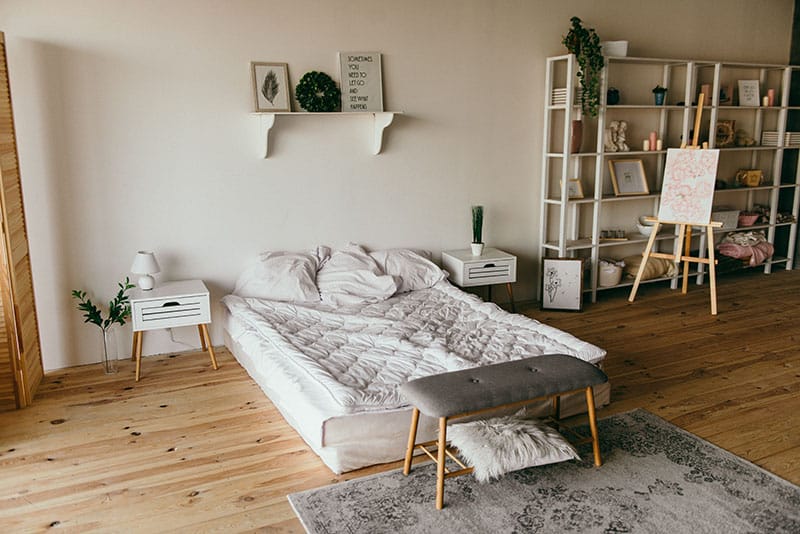Place a moisture barrier and a breathable layer, like a bed rug or slats, under the mattress. This prevents mold and promotes airflow.
Many people prefer placing their mattresses directly on the floor for simplicity and cost-effectiveness. While this setup has its benefits, it’s crucial to ensure proper support and ventilation. A moisture barrier protects the mattress from dampness and potential mold growth.
A breathable layer, such as bed slats or a bed rug, allows for adequate airflow, preventing trapped heat and moisture. These steps not only extend the life of your mattress but also provide a healthier sleeping environment. Proper care and the right materials under your mattress can make floor sleeping comfortable and hygienic.
Choosing The Right Surface
Placing a mattress directly on the floor can be a comfortable and cost-effective solution. But it’s essential to choose the right surface to ensure comfort and longevity for your mattress. Let’s explore key factors to consider.
Floor Material
The type of floor material can impact the comfort and durability of your mattress. Different materials offer varying levels of support and breathability. Below is a guide to help you understand the best options:
| Floor Material | Pros | Cons |
|---|---|---|
| Wood |
|
|
| Carpet |
|
|
| Tile |
|
|
Surface Protection
To extend the life of your mattress, consider surface protection. These measures can prevent wear and tear and enhance comfort.
- Rug or Carpet Pad: A rug or carpet pad can add a layer of cushioning. It also helps protect the mattress fabric from direct contact with the floor.
- Moisture Barrier: Placing a moisture barrier, like a plastic sheet, can prevent dampness from reaching the mattress. This is especially useful on tile or concrete floors.
- Mattress Protector: A waterproof mattress protector can shield against spills and stains. It also adds an extra layer of hygiene.
By choosing the right surface and adding proper protection, you can enjoy a comfortable sleep experience even with your mattress on the floor.
Importance Of Ventilation
Placing a mattress on the floor can be an economical choice. Yet, it is vital to ensure proper ventilation beneath the mattress. This helps avoid issues like mold and mildew. Let’s explore why ventilation is crucial.
Air Circulation
Good air circulation helps keep your mattress fresh. Without airflow, moisture can get trapped under the mattress. This can lead to bad odors and an unhealthy sleeping environment.
An easy solution is to use a slatted base. The gaps in the slats allow air to move freely. You can also prop up the mattress every few days. This helps it breathe and stay dry.
| Method | Benefit |
|---|---|
| Slatted Base | Allows air to circulate |
| Propping Up Mattress | Ensures drying and freshness |
Preventing Mold
Mold can grow in damp environments. A floor mattress without ventilation can become damp quickly. Mold spores can lead to allergies and respiratory issues.
Use a dehumidifier in your room. This reduces moisture in the air. Another option is to place a moisture barrier under the mattress. This can be a plastic sheet or a specially designed mat.
- Dehumidifier: Reduces air moisture
- Moisture Barrier: Prevents dampness from reaching the mattress
These small steps can make a big difference. They help keep your mattress mold-free and your sleeping area healthy.
Using A Mattress Protector
Placing your mattress directly on the floor can expose it to dust, dirt, and moisture. Using a mattress protector is a smart way to keep your mattress clean and extend its lifespan. A protector acts as a barrier, shielding your mattress from potential damage and allergens.
Types Of Protectors
There are various types of mattress protectors available, each offering unique benefits. Here are some common options:
- Waterproof Protectors: These protectors prevent moisture from seeping into the mattress.
- Allergen-Proof Protectors: Ideal for people with allergies, these block dust mites and other allergens.
- Cooling Protectors: Made with breathable materials, these keep you cool during sleep.
- Quilted Protectors: These add an extra layer of comfort and softness.
Installation Tips
Installing a mattress protector is simple and can be done in a few steps:
- Remove any bedding from your mattress.
- Unpack the mattress protector and lay it flat on the mattress.
- Secure the protector by fitting the elastic edges around the mattress corners.
- Smooth out any wrinkles to ensure a tight fit.
- Replace your bedding and enjoy the added protection.
By following these steps, you can ensure your mattress protector stays in place and provides maximum protection.

Credit: www.reddit.com
Adding A Rug Or Carpet
Placing your mattress directly on the floor can be practical. To enhance comfort and style, consider adding a rug or carpet underneath. This simple addition can make a significant difference in both aesthetics and functionality.
Benefits Of Rugs
Using a rug under your mattress offers multiple advantages:
- Comfort: Provides a softer surface underfoot.
- Insulation: Keeps your space warmer.
- Cleanliness: Helps keep dust away from your mattress.
- Style: Adds a decorative touch to your room.
Choosing The Right Rug
Selecting the right rug is crucial for both comfort and aesthetics:
- Size: Ensure the rug fits well under your mattress.
- Material: Choose durable and easy-to-clean materials.
- Thickness: Opt for a thicker rug for added comfort.
- Color and Design: Match the rug with your room’s decor.
Here’s a quick comparison of popular rug materials:
| Material | Benefits | Considerations |
|---|---|---|
| Wool | Soft and durable | May need professional cleaning |
| Cotton | Easy to clean | Less durable |
| Synthetic | Affordable and durable | Can trap dirt |
Using A Mattress Pad
Placing a mattress directly on the floor can be uncomfortable. A mattress pad can make a big difference. It adds an extra layer of comfort and support. Here’s how a mattress pad can help.
Comfort Enhancement
A mattress pad can significantly enhance comfort. It provides additional cushioning, making the sleeping surface softer. This can help in reducing pressure points on your body. Sleeping on a mattress pad can also offer better support for your back. This is especially important if you have a firm mattress. A mattress pad can create a more restful sleep experience.
Types Of Pads
There are various types of mattress pads available. Each type has its own benefits. Here are some common types:
- Memory Foam Pads: These conform to your body shape. They provide excellent support and comfort.
- Latex Pads: These are natural and hypoallergenic. They offer firm support and are durable.
- Feather Pads: These are soft and plush. They add a luxurious feel to your mattress.
- Wool Pads: These are breathable and regulate temperature. They keep you warm in winter and cool in summer.
- Cotton Pads: These are affordable and easy to clean. They offer a moderate level of comfort and support.
Choosing the right type depends on your specific needs. Consider your comfort preferences and any allergies. This will help you find the best mattress pad for your floor setup.

Credit: cosleepy.com
Incorporating A Bed Frame Alternative
Sometimes, using a traditional bed frame isn’t the best option. Maybe you prefer a minimalist look. Or perhaps you’re dealing with space constraints. Whatever your reason, there are creative alternatives available. Using pallets or platform bases can be a great way to elevate your mattress off the floor.
Pallets
Pallets are an affordable and stylish option. They provide a rustic charm and are easy to find. You can often get pallets for free from local stores or warehouses.
- Cost-Effective: Pallets are usually free or very cheap.
- Customizable: You can paint or stain them to match your decor.
- Ventilation: Pallets allow air to circulate under the mattress.
To create a pallet base:
- Gather 4-6 pallets of the same size.
- Sand them to remove splinters.
- Arrange them in a grid pattern.
- Secure them together with screws or brackets.
Platform Bases
Platform bases offer a modern look and strong support. They are easy to assemble and can be found in various designs.
| Feature | Benefits |
|---|---|
| Sturdy Support | Keeps mattress stable and firm. |
| Modern Design | Enhances the look of your room. |
| Easy Assembly | Can be set up quickly. |
To set up a platform base:
- Purchase a platform base kit.
- Follow the manufacturer’s instructions.
- Place the mattress on top.
Both pallets and platform bases are excellent alternatives to traditional bed frames. They provide unique benefits and are easy to set up.
Regular Maintenance
Maintaining your mattress on the floor is crucial. It ensures comfort, cleanliness, and longevity. Regular maintenance prevents mold, dust mites, and other allergens. Follow these steps to keep your mattress in top shape.
Cleaning Tips
Regular cleaning keeps your mattress fresh and hygienic. Here are some simple tips:
- Vacuum: Use a vacuum cleaner to remove dust and dirt.
- Spot Clean: Clean stains with a mild detergent and water.
- Air Out: Let your mattress air out every few months.
- Use Baking Soda: Sprinkle baking soda to neutralize odors.
- Wash Bedding: Clean your sheets and covers regularly.
Routine Inspection
Inspecting your mattress regularly helps spot issues early. Check for the following:
- Moisture: Look for any signs of moisture or mold.
- Wear and Tear: Examine the mattress for any damage.
- Insects: Check for bed bugs or other pests.
- Even Surface: Ensure the mattress remains flat and even.
Address any issues immediately to maintain a healthy sleeping environment. Following these steps ensures your mattress stays clean and supportive on the floor.

Credit: naplab.com
Tips For Extra Comfort
Sleeping with your mattress on the floor can be uncomfortable. There are ways to make it cozy. Follow these tips for extra comfort. Enjoy a good night’s sleep!
Adding Cushions
Adding cushions is a simple way to boost comfort. Place cushions around the mattress edges. This creates a softer barrier against the hard floor.
Opt for memory foam cushions for extra support. They mold to your body shape. This reduces pressure points and enhances comfort.
Consider using decorative pillows too. They can add both comfort and style. A variety of shapes and sizes works best.
Layering Techniques
Layering is key for a comfy floor mattress setup. Use multiple layers to create a soft base.
| Layer | Material | Benefit |
|---|---|---|
| First | Rug or Carpet | Insulates against cold |
| Second | Foam Pad | Provides cushioning |
| Third | Quilt or Blanket | Adds softness |
Use a rug or carpet as the first layer. It insulates against the cold floor. Next, add a foam pad. This provides cushioning and support.
Finally, place a quilt or blanket on top. This adds an extra layer of softness. Your mattress will feel much more comfortable with these layers.
Try these tips for a cozier sleep on your floor mattress. You’ll wake up feeling refreshed and well-rested.
Frequently Asked Questions
What To Put Under Mattress On Floor?
To prevent moisture and increase comfort, use a mattress protector. You can also use a rug or carpet.
Is It Safe To Put Mattress On Floor?
Yes, but ensure proper ventilation. This prevents mold and mildew buildup. Regularly lift and air out the mattress.
How To Keep Mattress Clean On Floor?
Use a waterproof mattress cover. Regularly vacuum the area. Elevate the mattress occasionally for air circulation.
Can I Use A Bed Frame Alternative?
Yes, consider using a futon or platform bed. Wooden pallets also work well for elevation and ventilation.
Conclusion
Choosing the right support for a mattress on the floor is crucial. It enhances comfort and extends mattress life. Consider options like rugs, mats, or pallets. These not only protect your mattress but also add style. Make an informed decision to enjoy a better night’s sleep.

